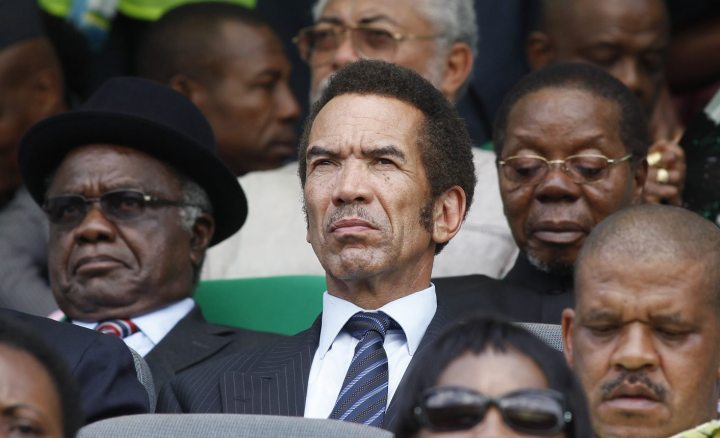Africa
Analysis: Ian Khama’s renegade foreign policy makes him a lonely figure in Africa

Alone among African countries, Botswana has rejected the results of the Zimbabwean elections. It’s a brave stand, bound to frustrate their neighbours, but not unexpected. Over the last few years, Botswana and its president have shown that they can think and act for themselves. By SIMON ALLISON.
As African countries and institutions fell over themselves to whitewash the results of the Zimbabwean elections, there was a lone dissenter among all the official voices. In what’s becoming a regular occurrence, Botswana found itself out of step with its regional and continental allies – and unafraid to upset the applecart.
“There is no doubt that what has been revealed so far by our observers cannot be considered as an acceptable standard for free and fair elections in SADC,” said Botswana’s Ministry of Foreign Affairs in a statement. “The Community, SADC, should never create the undesirable precedent of permitting exceptions to its own rules.”
The statement continued by calling for an independent audit of the Zimbabwe results, and for the inconsistencies in the report of SADC’s own election observers to be discussed at the SADC summit later this month.
As statements go, this one was undeniably brave and hugely embarrassing for South Africa and SADC, who both have pronounced themselves satisfied with the poll. Both also play hugely significant roles in landlocked Botswana’s economy. But the statement was not inconsistent. Over the last few years, Botswana has made something of a habit of doing its own thing in the foreign policy arena, shamelessly flouting the unwritten rule of African diplomacy that priorities consensus and a united front above all else.
A few examples. Despite his international arrest warrant, Sudanese President Omar al-Bashir has been welcomed in many African capitals, even in countries that have signed the Rome Statute (meaning they are obligated under international law to arrest him). But he won’t be touching down in Gaborone any time soon. Botswana has repeatedly and vehemently asserted that they would happily detain Al-Bashir and hand him over to the International Criminal Court, defying pressure from the African Union to ignore the arrest warrant. “We have not surrendered the sovereignty of this country to the AU,” foreign minister Phandu Skelemani said pointedly in 2010. President Ian Khama was also instrumental in getting Malawi to deny Al-Bashir entry to the planned AU summit in Lilongwe last year – a diplomatic headache that caused the whole thing to be moved to Addis Ababa.
The foreign minister cause another diplomatic incident, this time with Kenya, when he applied the same principle in March to the then-president-elect Uhuru Kenyatta, who is already on trial at the ICC. “If he refuses to go (to The Hague), then we have a problem. That means that they do not know the rule of law. You can’t establish a court and refuse to go when it calls you. If he refuses, he won’t set foot here.” Skelemani later apologised for these comments, but only because they seemed to pre-judge Kenyatta’s actions; there’s no doubt that the Kenyan president won’t be welcome in Botswana if he backs out of the trial.
Botswana was also one of the first countries to break off relations with Muammar Gaddafi’s Libya in 2011, as it became apparent he was murdering protestors in cold blood. At the same time, a completely befuddled African Union was trying to get the international community to give Brother Leader a break.
Incidentally, the headlines about Botswana’s action on Libya mirrored those reporting its response to the Zimbabwean election. “Botswana breaks ranks over Gaddafi”, reported AFP in 2011; “Botswana breaks ranks with other African countries, says Zimbabwe poll wasn’t free and fair”, reports AP in 2013. Botswana, it seems, is not afraid to go it alone if and when it feels the circumstances demand.
This bold foreign policy seems to be largely the brainchild of Botswana’s President Ian Khama, firstborn son of Sir Seretse Khama, the country’s liberation president. In his five years in office, Khama has overseen Botswana’s consolidation of its position as one of Africa’s best-governed countries, with impressive economic and development indicators (his record is much less impressive when it comes to treatment of Botswana’s San population).
Not that he’s particularly consistent in applying his foreign policy ideals. Critics in Botswana have taken him to task for failing to take any kind of action against other African leaders implicated in human rights violations, such as Swaziland’s King Mswati III or the late Malawian president Bingu wa Mutharika. He’s also criticised for failing to produce an outline of what Botswana’s foreign policy principles actually are.
“Botswana has no clear foreign policy,” said Bame Piet, a journalist with Mmegi/The Reporter, Botswana’s main newspaper, speaking to the Daily Maverick. “He’s very reluctant to come up with a clear position. It seems to be how he feels at that given point … Nobody knows what is going on in his head.”
Whatever’s going on in his head it’s not making him popular with his fellow African leaders. By refusing to run with the pack, Ian Khama cuts a lonely figure on the African diplomatic stage. Given the scarcity of other dissenting voices, let’s hope he keeps it up. DM
Read more:
- Botswana faults Zimbabwe election, calls for audit, on Reuters
Photo: Botswana’s President Ian Khama is flanked by Namibia’s President Hifikepunye Pohamba ( L) and Malawi’s former president, Bakili Muluzi (R, with glasses) during the ANC’s centenary celebration in Bloemfontein January 8, 2012. REUTERS/Siphiwe Sibeko
















 Become an Insider
Become an Insider